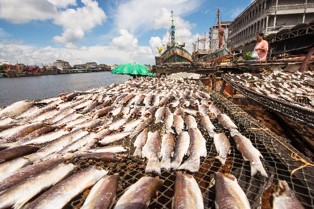[et_pb_section bb_built=”1″][et_pb_row][et_pb_column type=”1_4″][et_pb_text _builder_version=”3.19.5″]
Mandate > Overview
Overview
Key Programmes
Thematic Areas
Cross-Cutting Areas
[/et_pb_text][/et_pb_column][et_pb_column type=”3_4″][et_pb_text _builder_version=”3.19.5″]
 The Asia-Pacific region, with over 4.4 billion people, is home to nearly 60 per cent of the world’s population. Although highly diversified, the countries in the region share the dominance of smallholder farming, declining availability of fertile lands and water, notable levels of poverty, and large productivity gaps. Population growth and rising incomes have placed considerable pressure on natural resources creating competition for water, land and energy. Climate change, deforestation, soil degradation, overfishing and air pollution are other critical issues the region is facing, significantly impacting the region’s environment and its agri-food systems.
The Asia-Pacific region, with over 4.4 billion people, is home to nearly 60 per cent of the world’s population. Although highly diversified, the countries in the region share the dominance of smallholder farming, declining availability of fertile lands and water, notable levels of poverty, and large productivity gaps. Population growth and rising incomes have placed considerable pressure on natural resources creating competition for water, land and energy. Climate change, deforestation, soil degradation, overfishing and air pollution are other critical issues the region is facing, significantly impacting the region’s environment and its agri-food systems.
Other regional challenges to agri-food systems include low affordability of food, high food-price inflation and lack of assurance in food safety. Poor value addition to agricultural commodities and weak linkages between farmers and markets also mean that farmers have to operate on small scales, mainly on a subsistence basis. Farmers also have limited technical skills and poor access to information and capacity to improve their production, processing and marketing practices.
These challenges, within the region, but more specifically within the agri-food systems, present numerous opportunities to collectively work towards more sustainable and inclusive socioeconomic development. The question is how to ensure that the economic growth benefits all people, whilst simultaneously protecting the environment and future generations.
The new set of goals to end poverty, protect the planet and ensure prosperity for all – the Sustainable Development Goals (SDGs) – present a wider agenda that aims to address the root causes of poverty, whilst simultaneously considering environmental protection, gender inequality, human rights and inclusive economic development. The new sustainable development agenda is critical to the Asia-Pacific region, since agriculture will continue to remain one of its primary economic sectors. Any change in agriculture will impact the socioeconomic development of the region.
Creating a more sustainable and inclusive agri-food system requires collective actions in capacity development and targeted investment to improve agricultural research and innovation systems. APAARI members, partners and other stakeholders, believe that only science that can identify the most efficient and sustainable production systems and innovation is paramount to overcoming the broader challenges facing the Asia-Pacific region. As such, they approach science and technology collectively, as the challenges described transcend country borders and hence require regional solutions. A strengthened agri-food research and innovation system will contribute to stronger agri-food systems, and to the realization of the SDGs.
[/et_pb_text][/et_pb_column][/et_pb_row][/et_pb_section]